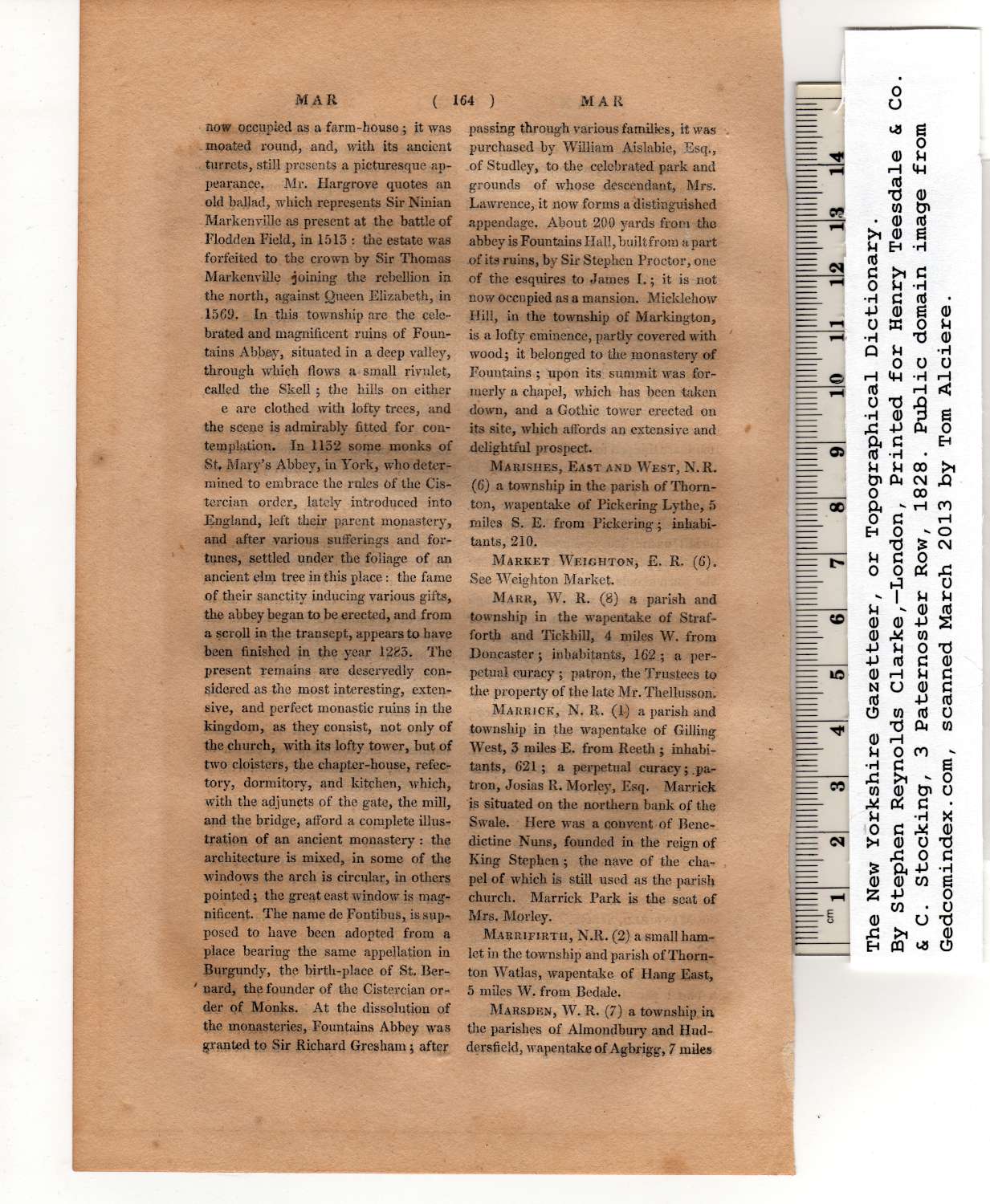|
now occupied as a farm-house; it was
moated round, and, with its ancient
turrets, still presents a picturesque ap-
pearance, Mr. Hargrove quotes an
old ballad, which represents Sir Ninian
Markenville as present at the battle of
Flodden Field, in 1513 : the estate was
forfeited to the crown by Sir Thomas
Markenville joining the rebellion in
the north, against Queen Elizabeth, in
1569. In this township are the cele-
brated and magnificent ruins of Foun-
tains Abbey, situated in a deep valley,
through which flows a small rivulet,
called the Skell ; the hills on either
e are clothed with lofty trees, and
the scene is admirably fitted for con-
templation. In 1132 some monks of
St. Mary’s Abbey, in York, who deter-
mined to embrace the rules of the Cis-
tercian order, lately introduced into
England, left their parent monastery,
and after various sufferings and for-
tunes, settled under the foliage of an
ancient elm tree in this place: the fame
of their sanctity inducing various gifts,
the abbey began to be erected, and from
a scroll in the transept, appears to have
been finished in the year 1283. The
present remains are deservedly con-
sidered as the most interesting, exten-
sive, and perfect monastic ruins in the
kingdom, as they consist, not only of
the church, with its lofty tower, but of
two cloisters, the chapter-house, refec-
tory, dormitory, and kitchen, which,
with the adjuncts of the gate, the mill,
and the bridge, afford a complete illus-
tration of an ancient monastery : the
architecture is mixed, in some of the
windows the arch is circular, in others
pointed; the great east window is mag-
nificent. The name de Fontibus, is sup-
posed to have been adopted from a
place bearing the same appellation in
Burgundy, the birth-place of St. Ber-
' nard, the founder of the Cistercian or-
der of Monks. At the dissolution of
the monasteries, Fountains Abbey was
granted to Sir Richard Gresham; after
passing through various families, it was
purchased hy William Aislabie, Esq.,
of Studley, to the celebrated park and
grounds of whose descendant, Mrs.
Lawrence, it now forms a distinguished
appendage. About 200 yards from the
abbey is Fountains Hall, built from a part
of its ruins, by Sir Stephen Proctor, one
of the esquires to James I.; it is not
now occupied as a mansion. Micklehow
Hill, in the township of Markington,
is a lofty eminence, partly covered with
wood; it belonged to the monastery of
Fountains ; upon its summit was for-
merly a chapel, which has been taken
down, and a Gothic tower erected on
its site, which affords an extensive and
delightful prospect. |
Marishes, East and West, N.R.
(6) a township in the parish of Thorn-
ton, wapentake of Pickering Lythe, 5
miles S. E. from Pickering; inhabi-
tants, 210.
Market Weighton, E. R. (6).
See Weighton Market.
Marr, W. R. (8) a parish and
township in the wapentake of Straf-
forth and Tickhill, 4 miles W. from
Doncaster ; inhabitants, 162 ; a per-
petual curacy ; patron, the Trustees to
the property of the late Mr. Thellusson,
Marrick, N, R. (1) a parish and
township in the wapentake of Gilling
West, 3 miles E. from Reeth ; inhabi-
tants, 621; a perpetual curacy ^pa-
tron, Josias R. Morley, Esq. Marrick
is situated on the northern bank of the
Swale. Here was a convent of Bene-
dictine Nuns, founded in the reign of
King Stephen; the nave of the cha-
pel of which is still used as the parish
church. Marrick Park is the seat of
Mrs. Morley.
Marrifirth, N.R. (2) a small ham-
let in the township and parish of Thorn-
ton Watlas, wapentake of Hang East,
5 miles W. from Bedale.
Marsden, W. R. (7) a township in
the parishes of Almondbury and Hud-
dersfield, wapentake of Agbrigg, 7 miles |
